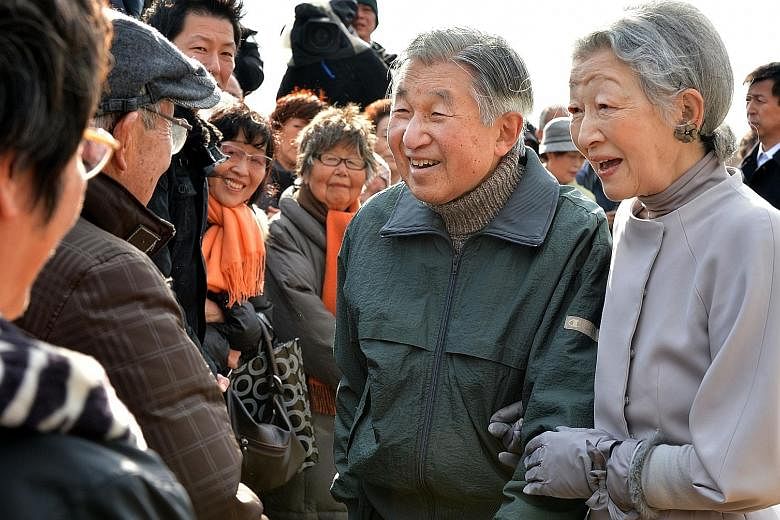Japanese Emperor Akihito has, for decades, been rewriting the rules to an antiquated imperial institution.
He is the first monarch in a long bloodline extending 2,500 years to marry a commoner - Empress Michiko is daughter to a flour-miller - whom he met on a tennis court.
He is one of the world's top authorities on the goby fish, and besides having a species named after him, the 1986 paper, Some Morphological Characters Considered To Be Important In Gobiid Phylogeny, is considered a seminal work in the field.
And now the 82-year-old hopes to step down from the throne if he is unable to fully perform his duties.
This will require revisions to a law dating from the 1889 Meiji Constitution that prevents power struggles between a retired and a sitting emperor.
The 1947 post-war Constitution did not address the issue of abdication, although it reduced the ruler's divine status to a ceremonial one as "the symbol of the State and of the unity of the people". This is a role that Japan's 125th emperor has deeply embraced over his decades on the Chrysanthemum Throne.
The soft-spoken "people's emperor" has touched hearts on visits to earthquake zones in Kobe in 1995, Fukushima in 2011 and Kumamoto this year - entering crowded gymnasiums packed with survivors and visiting temporary housing shelters.
He has knelt to speak eye-to-eye to the injured and those in wheelchairs, and in 2011 made an unprecedented speech on television to console and rally the nation. He had said: "I want all citizens of Japan to remember everyone who has been affected by the devastation, not only today, but for a long time afterwards - and help with the recovery."
This human touch is a trait that his father - the late Emperor Hirohito who ruled from 1926 until his death in 1989 - was said to have lacked, and it has gone a long way to bridge the divide between the royal family and the common man.
Meanwhile, Emperor Akihito was also active in forging closer bilateral ties with other countries.
He has visited 55 countries, including Singapore where in 1970, the then-Crown Prince and Crown Princess planted a pair of King Sago Palms at the Japanese Garden. The royal couple's last visit was in 2006 to mark 40 years of diplomatic ties.
Japan has posthumously awarded founding prime minister Lee Kuan Yew its highest honour - the Grand Cordon of the Order of the Paulownia Flowers - and Prime Minister Lee Hsien Loong will receive this on behalf of the late Mr Lee during a visit to Japan in September. This award is typically bestowed by the Emperor, whose close ties with the late Mr Lee were evident in how the royal couple sent flowers when Mr Lee died last year - the first time they had done so for a foreign prime minister.
Emperor Akihito's ties with East Asia also run deep. He has spent much of his time on the throne trying to soothe wartime wounds between Japan and its former foes - even as the country gradually shifts to the right. In 2001, he infuriated Japanese nationalists when he recognised the imperial family's part-Korean roots.
He has also often expressed "deep remorse" for Japan's wartime atrocities, including on a visit to China in 1992 and again in a speech last year to mark the 70th anniversary of the end of the war.
He said last year: "Looking back at the past, together with deep remorse over the war, I pray that this tragedy of war will not be repeated and together with the people express my deep condolences for those who fell in battle and in the ravages of war."
The non-partisan Emperor, who began his reign in 1989, has been a source of consistency for the Japanese people over a period of economic stagnation that saw as many as 17 prime ministers.
He is not believed to have any pressing health issues, although he had surgery for prostate cancer in 2003 and a heart bypass operation in 2012. He was also hospitalised with pneumonia in 2011.
He is said to have floated the idea of passing on the throne to his elder son, Crown Prince Naruhito, 56, in case he is no longer able to fully perform his duties in future. He candidly admitted on the eve of his birthday last year that old age was catching up with him.
Should he step down, he will be following the footsteps of his peers like Dutch Queen Beatrix, who abdicated in 2013, aged 75, after 33 years to hand the throne to "a new generation".
His legacy is likely to last beyond his reign, experts say. Professor Jeffrey Kingston, director of Asian Studies at Tokyo's Temple University, told Bloomberg: "He has done more than all of Japan's politicians put together in terms of raising Japan's stature in the region - he is known as the people's emperor."

